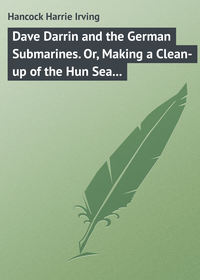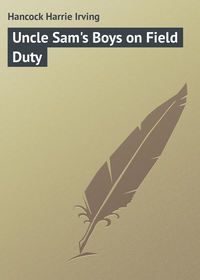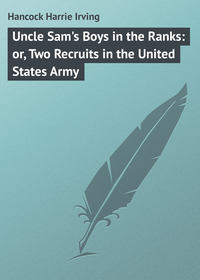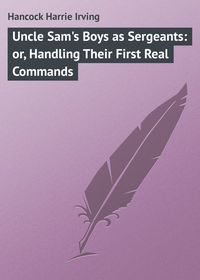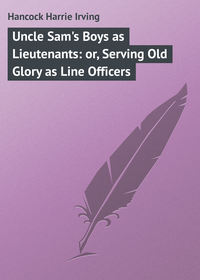 полная версия
полная версияDave Darrin on the Asiatic Station. Or, Winning Lieutenants' Commissions on the Admiral's Flagship
“None the less, I had my moments of scare,” Darrin assured her.
“You surely are jesting,” asserted Belle.
“Not a bit of it, my dear. Every man who has to fight and who is honest about it will admit that he is often badly scared.”
“Am I interrupting a private conversation, Mr. Darrin?” asked the executive officer.
“Not in the least, sir,” replied the young ensign, raising his cap.
“Then what I have to tell you is that our wireless picked up the admiral’s flagship a little while ago, and we have reported what took place here yesterday. We are under orders to sail as promptly as possible, and the flagship will meet us at the mouth of the river. The flagship will also try to pick up some coasting steamer, which will carry the missionary party and others down the coast to Shanghai, which is considered a safer place at present for Americans.”
“Did the Admiral approve of what was done here yesterday, sir?”
“He expressed neither approval nor criticism, but will take our detailed report when we join. The ladies will be summoned to breakfast soon, Mr. Darrin. Most of the officers will breakfast at second table to-day, but on account of Mrs. Darrin’s presence on board you will go to first table with her. You will take my place at the head of the table.”
“And, of course, as soon as the civilians are transferred to that coasting steamer I shall have to go with them,” pouted Belle. “It may be months before I shall see you again. I had hoped to be with you at least a few weeks in Manila. Instead, I had to come here. I have had a day with you – and what a day!”
“It’s hard, dear,” sighed Dave, “but such is a naval officer’s life. However, our turn will come. One of these days I shall be ordered to shore duty for a while, and then we shall be together, month after month. We shall even be able to have a little home of our own. It may be, dear, that my shore duty will be at Washington.”
“Yes,” groaned Mrs. Darrin. “And if you send for me to come and join you in Washington, by the time I arrive there I shall find out that you have just been sent away on a three-year rescue cruise to find some lost explorer at the South Pole! That is the Navy!”
When the breakfast call came Dave led his wife into the wardroom, conducting her to her seat at table and seating himself beside her.
Before the meal was ten minutes under way the deck watch began to make active preparations for the start down the river. As the anchor was being hoisted a large boat put out from the shore flying the governor’s banner.
As it came alongside a great bale was hoisted on board, addressed, simply, “To the American Ladies.”
An envelope bearing a similar address was brought aboard by an officer from the governor’s yamen, as well as a second envelope addressed to Lieutenant-Commander Tuthill.
The second letter was delivered at once. It contained an expression of the governor’s “profound regret” over the occurrences of the day before, and stated that, the governor’s troops having fortunately returned, his excellency was now able to guarantee the safety of all Americans who might condescend to honor the city by their presence ashore.
The governor’s letter ended with the statement that he had endeavored to express his apologies to the American ladies in a more tangible if very humble and poor form.
The American commander immediately dictated a letter thanking his excellency for his letter and assurances, but adding that, under orders, the American party was being taken to the mouth of the Nung-kiang River.
“Get this letter over the side and signal the engine-room for half-speed ahead,” Lieutenant-Commander Tuthill brusquely directed.
So, before breakfast was ended, the “Castoga” was steaming down the muddy river.
Not until the officers and male guests had been served at second table was any mention of the bale made by the busy executive officer. Then the ladies were once more summoned to the wardroom, while two sailors undid the package that had come from the governor.
The contents would have made a gift fit, indeed, for a royal family. There were more than enough handsome furs to go all around. There were silks, such as are never seen in America. Gold hair ornaments and rare jade jewelry were there in abundance, and many other articles dear to the feminine heart.
“If this is a true expression of the governor’s regret, then I wonder that he could ever have permitted the rioting to start,” said one of the women.
“But, under the circumstances, have we any right to accept such valuable gifts?” asked Belle Darrin.
“Shall I have them thrown overboard, then?” queried Mr. Warden, smilingly.
“No; of course not,” replied another woman, “but I feel that these magnificent gifts should be returned.”
“How?” asked the executive officer. “This gunboat may never enter the Nung-kiang River again.”
“It begins to look,” laughed Dave, “as though the necessities of the case compel the acceptance of these visible expressions of the governor’s invisible regrets. There is no way to send the stuff back.”
It took an hour’s discussion to convince the women that they must perforce accept. That point settled, they proceeded to divide the gifts by lot.
“Where am I going to put all this plunder?” Belle asked her husband as she gathered up her own considerable share of the “expressions of regret.” “I haven’t a single piece of baggage.”
“I fear I shall have to place them in my chest, and turn them over to you when we next meet,” Dave suggested.
“And I may very likely be an old woman by that time,” sighed Belle.
At noon Dave took the bridge until four o’clock. It was just before his watch was finished that the mouth of the river was made. Two miles off shore the flagship could be seen, steaming back and forth. A quarter of a mile away a small ocean-going steamer followed a similar course.
“And I won’t have a chance to cry on my husband’s shoulder for a few moments,” Belle complained, tragically, to another woman. “He’s stuck away up forward on the bridge.”
“Your husband will be off duty in ten minutes,” Lieutenant Warden assured her. “He will have command of the launch that transfers the party to the coasting vessel.”
“In the Navy the smallest favors look like great ones,” Belle observed to herself.
Watch changed just before the gunboat ran up behind the stern of the flagship.
Relieved of his duty on the bridge, Dave received his further orders and immediately called the launch crew to quarters.
Launched and brought alongside, the motor boat was quickly filled with the refugees.
Dave gave the order to cast off, then sat down beside Belle. Their time was altogether too short. The halted coasting steamer received the refugees on board, Dave, too, going up over the side.
In the instant that he and Belle clung together she whispered:
“Shall I go to Yokohama and await the chance to join you?”
“That will be a fine idea, little girl!” cried Dave. Then with a final kiss he went down over the side and into the launch.
“Cast off. Make back to the gunboat.”
The coastwise steamer was already sounding her hoarse whistle, and moving under slow way.
Once in the launch, Ensign Darrin stood up and waved his cap at the lonely little figure standing by the stern rail on the after-deck of the steamship.
Until the launch rounded up under the “Castoga’s” quarter Dave waved his cap frequently. Through the mist that lay over his eyes he could barely see the answering fluttering of white on the deck of the southbound steamship.
“Let the crew remain in the launch,” came from the officer of the deck. “Ensign Darrin will report to the executive officer.”
“Lieutenant-Commander Tuthill and Ensigns Darrin and Dalzell are ordered aboard the flagship,” announced the executive officer. “Mr. Darrin, you will make the necessary change in uniform.”
Hastening to his quarters, Dave changed to full dress uniform for which the regulations now called. He girded on his dress belt, with his dress sword, and drew on white gloves. Then he gained the deck, saluting and reporting to the commander of the gunboat.
“We shall be called upon to make our report, Mr. Darrin, of the Nu-ping affair. It is a good thing that we can do so with clear consciences,” smiled the Lieutenant-Commander.
“The Admiral may not approve of all that I did to His Excellency, the Governor,” remarked Ensign Dave.
“I think he will,” replied the commanding officer. “In my opinion, at least, you made the best possible use of your discretion.”
“Thank you, sir.”
Soon the three officers from the gunboat found themselves on the quarter-deck of the battleship “Katahdin,” flagship of the Asiatic Fleet.
Captain Tucker received them and then remarked:
“I have orders to conduct you at once to Admiral Branch.”
The Admiral gave the three visiting officers pleasant if formal greeting.
“This is my report, sir, in writing, of the affair at Nu-ping,” declared Lieutenant-Commander Tuthill, passing over a bulky official envelope.
“Quite so,” observed Admiral Branch. “I will read it at once.”
For more than five minutes the three officers remained seated, and in silence, while the Admiral slowly turned the pages of the report.
From time to time the fleet commander frowned. Dave, noting this, wondered to what features of his conduct in Nu-ping Admiral Branch most objected.
“Dave is surely going to catch it,” reflected Dan Dalzell uneasily. “I wonder if I shall come in for some of the scotching, too. But probably there’ll be no such luck. Dave was ranking officer ashore, and I acted only on his orders. I wish I could take my share in the storm.”
Having read the last page of the report, the Admiral slowly, thoughtfully folded it, laying it away in a pigeon-hole over his desk.
“Surely, Mr. Darrin, you found some new ways of treating a Chinese viceroy, or, I should say, governor,” remarked the fleet commander dryly.
“I tried, sir, not to subject him to any annoyance or indignity that could be avoided,” Darrin responded gravely.
“And in a way that would have been impossible, had the governor been attended by his usual number of troops,” continued Admiral Branch. “Under the circumstances, however, you treated him in a way that I, as a junior officer, often longed to handle many an important Chinese official.”
Though the fleet commander spoke gravely there was an unmistakable twinkle in his eyes. Dave’s hopes began to rise.
“I shall endorse Lieutenant-Commander Tuthill’s report as being satisfactory to myself,” continued the Admiral, “and then shall send the report on through the usual channels. And I sincerely trust, Mr. Darrin, that the Navy and State Departments at Washington will also endorse the report. For myself, Ensign Darrin, I congratulate you on your handling of a most unusual and highly difficult lot of problems. I congratulate you, sir,” continued Admiral Branch. “I shall be glad to have you aboard this ship.”
“On this ship, sir?” asked Darrin, as he took the Admiral’s outstretched hand.
“Yes; but that is another story, and perhaps I had better tell that first. Some transfers have been ordered in the Asiatic Fleet. Among other changes, Ensigns Holton and Brown, now on this ship, are ordered to duty on the ‘Castoga,’ and Ensigns Darrin and Dalzell are ordered to the ‘Katahdin.’ I fancy, gentlemen,” turning to the two younger officers present, “that very likely you have seen as much as you wish of China for the present, so you will be glad to know that this ship is ordered to Japan, and that we shall likely be there for two months or more. You will move your baggage over to this ship and report for duty as quickly as possible.”
CHAPTER XVI – THE MEDALLION MYSTERY
“Hullo, Darrin; come over here just a moment. I want you to see something that is rather unusual, even in Japan.”
Two young men, who had just entered the American Club in Tokio, turned when this hail to one of them was heard.
The hail came from a group in which sat four Americans, one Englishman and three young Japanese. The latter three were in the uniforms of lieutenants of the Emperor’s infantry.
“Come over with me, Dan,” urged Dave in a low voice, as Dalzell held back slightly.
“I wasn’t invited,” murmured Dan.
“You simpleton, that’s because Carter doesn’t know you. I can introduce you, and that will set you straight.”
“How are you, Carter?” asked Dave, as he went straight up to the young man who had hailed him and held out his hand. “I wish to introduce my friend, Mr. Dalzell, same service and same ship.” In turn Dave and Dan were presented to all in the group.
The American naval officers wore blue civilian suits. Carter belonged to the diplomatic service, and was now stationed in Tokio. Dave had first met him in Washington. One of the other Americans was in business in Tokio, and the other two were tourists.
“Mr. Katura was showing us something so wonderful,” Carter explained, “that I asked his permission to call you over to see it. Will you show that wonderful medallion again, Katura?”
The little lieutenant, who appeared to be very shy and diffident, flushed slightly as he bowed. Then, from an inner pocket, he drew out a small lacquer box, from which he took out and passed to Dave a filigree gold plate on which appeared the delicately tinted face of a beautiful Japanese woman.
“I never saw anything so wonderfully exquisite,” gasped Darrin, in genuine admiration. “I didn’t know that such beautiful work could be done.”
“No one in Japan could do it to-day,” spoke up another of the Japanese officers, Toruma by name. “That medallion comes from the most brilliant period of Satsuma art.”
In that face the paler flesh tints had been laid, with wonderful minuteness of detail, from flawless mother of pearl. The hair, which stood out in life-like accuracy, had been worked in some highly polished blue-black stone. The teeth, as they showed in the parted lips of that tiny miniature, were real seed pearls, worked in the exact shapes of the teeth represented.
The most striking feature of all was the beautiful red lips of the tiny mouth. This red had been laid in fine rubies, not showing separately, but blended delightfully.
For fully two minutes Darrin gazed at the miniature face, fascinated with the beauty of the thing. Dan, standing by, admired it also.
“Now, try the effect of this magnifying glass on the face,” suggested Carter.
“It would be almost wicked to hold a magnifying glass over such a treasure,” protested Ensign Dave, recoiling slightly, as though from a profanation of an art treasure.
“Try the glass; don’t be afraid,” said Carter.
So Dave took the glass, focusing it over the wonderful medallion. A cry of wonder escaped the young ensign’s lips.
“Can you find the slightest appearance of roughness under the glass?” asked the American diplomat.
“I cannot,” Dave confessed.
“Think of the wonderful work of the artist,” suggested Toruma, “who, in an age when magnifying glasses were unknown, could join all the parts of that inlaying so perfectly.”
“It is wonderful,” murmured Dave. “The artist’s eyes must have been as keen as any magnifying lens.”
For some minutes more Darrin examined the medallion, both with the glass and without. The Japanese, smiling and affable, stood enjoying his very evident pleasure. Their hearts warmed to a foreigner who could feel such real appreciation of the marvels of the ancient art of their country.
“Here, I am afraid that you had better take this from me,” begged Darrin laughingly, at last. “If it is much longer in my possession I shall be under a temptation to commit grand larceny.”
Smiling, Lieutenant Katura held out his hand to receive the treasure.
“It has been in our family for at least six hundred years,” he explained proudly, though without any sign of boastfulness. “It belongs to my mother.”
“I should think you would be afraid of its being stolen,” suggested Dave.
“Ordinarily it is kept in the Okugawa Bank, in our family vault,” explained the little lieutenant. “Once Mr. Carter saw the medallion, at our home, and to-day he begged me to bring it here to show to some of his friends. I am glad to have been honored with an opportunity to give you pleasure by the sight of it.”
“But surely you don’t carry such a treasure loosely in your pocket like that,” Dave almost protested.
“Why not?” smiled Katura.
“Are you not afraid of its being stolen?” Darrin went on.
“Not likely,” declared the little lieutenant. “I am able to defend myself, and I shall have my friends with me on my trip back to the Okugawa Bank.”
“But pickpockets might brush against you in a crowd, and take it from you,” Dave hinted.
“They will not have that chance,” smiled Katura. “From here to the bank my friends and I will go in jinrikishas.”
As the tiffin (luncheon) hour drew near, the club rooms began to fill. There were, perhaps, a hundred newcomers.
“You’ll come to our table, Darrin?” asked Mr. Carter.
“I thank you, and under any other circumstances I would,” Dave answered. “My wife will be expecting me at the hotel. She and I have not had many opportunities to lunch together since I entered the service. So I shall have to be going along soon.”
“You’ll stay, Dalzell?” asked the diplomat.
Dan decided that he would. The Japanese officers were invited to remain, but replied that they had duties claiming their attention.
So Dave left with Lieutenants Katura, Toruma and Hata. In the main corridor these departing ones found themselves somewhat delayed, owing to the press of the crowd about one of the coat-rooms.
At last they got through. A Japanese attendant, saluting the three officers of his own country, ran nimbly to the end of the porch, striking his hands together and summoning three jinrikisha men, who raced up to the steps.
“Farewell, for an hour or two, at least, American brother in arms,” cried Toruma, the most talkative of the three Japanese. Friendly salutes were exchanged, and the Japanese trio were rushed away.
Dave’s jinrikisha came around. In appearance it was an exaggerated baby-carriage, with shafts, between which a stout Japanese coolie played the part of a horse.
These curious little street vehicles are comfortable, and the seasoned coolie in the shafts often displays great speed. The slowest he is allowed to travel on short journeys, when he has a fare in his ’riksha, is five miles an hour.
“To the Imperial Hotel,” said Dave briefly. That was all that was needed. The human “horse” in the shafts would do the rest.
In a few minutes Dave arrived at the big, handsome Imperial Hotel. This hostelry, famous among travelers in the East, is an imposing white pile, built originally by the Japanese government, that travelers might be sure of having a stopping place as comfortable as any in the lands from which they came. Bit by bit the management bought over the government’s interest in the hotel, until now it is privately owned, though the pride of the Japanese is such that the government still supervises the hotel, and sees to it that the high standard is kept up.
As Dave Darrin entered he passed into one of the parlors at the entrance. Belle rose and came forward, a glad little cry on her lips.
“How thankful I am that I thought of coming to Yokohama!” she cried. “It was but a step to Tokio. And you are punctual.”
“It is one of the virtues – or vices – of an officer and a gentleman,” Darrin laughed, as he bent over to kiss her.
“And now are you ready for tiffin, dear?”
“I shall be as soon as I have made my toilet,” Dave replied. “May I have your indulgence that long?”
“Certainly.”
Going below Ensign Darrin washed off the dust of his forenoon’s wanderings, smoothed back his hair, and with a final look in the glass drew on his coat and started above.
Dave was now in about the middle of a three-weeks’ leave, which Dalzell had taken at the same time. In the Navy service an officer does not have, regularly, one day in every seven on which he is free from toil. He is on duty, day and night, seven days a week. By way of leisure he is allowed a certain portion of every month, when practicable, in the way of “leave.” When an officer has no especial use for leave, he often allows it to accumulate, and then later on secures a long enough leave to use up his privileges in the way of absence from duty. So Dave was now on a three-weeks’ leave – a “vacation” it would be called in civil life.
Several other officers from the “Katahdin” were in either Yokohama or Tokio. The former city, only a few miles from the latter, is the port of entry for the Japanese capital. In the harbor at Yokohama the American flagship now lay.
Up to the present Darrin had devoted most of his waking time to escorting Belle through the bewildering Japanese shops, to Uyeno Park, to the Japanese theatres, to the famous temples, and all the other sights that attract tourists.
But this forenoon Darrin had spent in going about Tokio, meeting a few of the people whom he had known in other parts of the world. There was Lieutenant Anstey, one of Dick Prescott’s West Point chums, now on duty at the American Embassy; there were naval officers, and two or three men in the diplomatic service. Dave had even called at the Japanese Navy Department to shake hands with two Japanese officers whom he had met in Europe. These latter two were absent, and Dave, leaving cards, had promised to return in the afternoon.
“You are going to be busy this afternoon?” Belle asked as they sat at tiffin.
“I shall have to make two or three calls, but I shall come back to you as early as I can.”
Two or three times it was on the tip of Darrin’s tongue to tell his wife of the wonderful medallion he had seen that morning. In each case some remark or question of Mrs. Darrin’s had prevented.
In the meantime, Lieutenant Katura, on entering the Okugawa Bank, had made an amazing and frightful discovery. The lacquer box, containing the priceless Satsuma medallion, was not in any of his pockets! The young lieutenant’s grief was most frantic. In vain Toruma and Hata tried to comfort him.
An hour after Ensign Darrin had left the Imperial Hotel, on his way to the Navy Department and elsewhere, Belle Darrin, going up to their rooms, found a little package and a note lying on a table in the middle of their parlor.
Scenting some loving surprise from her husband, Belle, womanlike, opened the package first, disclosing a small lacquer box. In the box she found the same medallion that had so fascinated her young husband that forenoon.
“Oh, oh, oh!” cried the delighted girl, in as many notes of happiness.
Then, still eager, she laid down the medallion and tore open the envelope. On a sheet of heavy paper she read:
“Dear Mrs. Darrin: This comes to your hand from one who is a stranger to you, but who is a most devoted friend of your husband. He has admired the pretty trinket which comes with this note, and I know that he had it in mind that he would dearly love to hand it to you. I am taking the liberty, as your husband’s friend, of pleasing Ensign Darrin, the dearest fellow in the world. But I am going to ask of you a very unusual favor. Fearing that your husband might have the extreme delicacy to insist upon returning this bauble, I am going to ask you not to mention receipt of it until to-morrow. By that time the sender, as your husband will know, will be too far away for the immediate return of this trifle. By the time that he can communicate with me again I trust that he will have agreed to give me the great pleasure of making him happier through the knowledge that his wife possesses a treasure that I know he wished to secure for her.
With every best assurance,(Signed) X. Polemkin.”This strange note dropped from Belle’s fingers to the table. There was a clouded look in her eyes. She did not even turn for another glance at the priceless medallion.
“Secrets from my husband?” she murmured, pouting. “I don’t believe I can do a thing like that. No; it wouldn’t be right. As soon as Dave returns I must show him this medallion and the note.”
Perhaps, in her heart, Belle hoped that Dave would tell her that circumstances were such that she might properly keep the gift so strangely sent. Be that as it might, Belle Darrin had no notion of keeping any secret that might mean a wound to her gallant young husband’s trusting heart.


